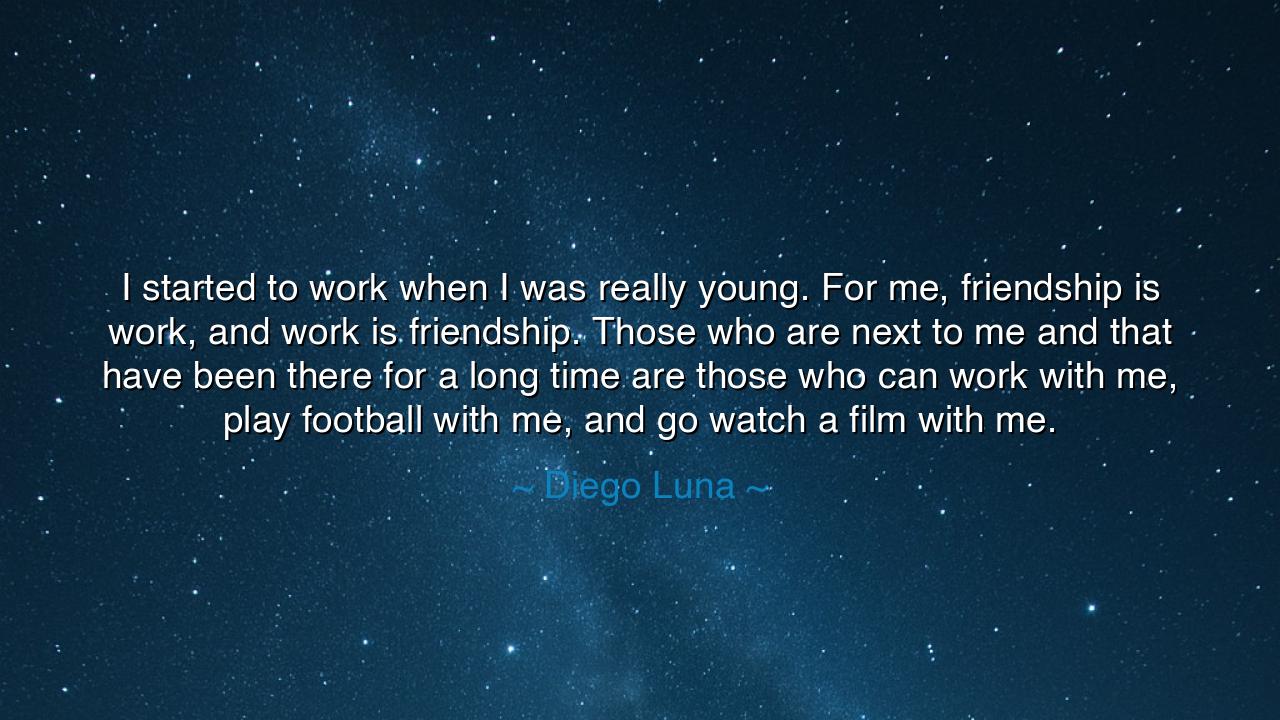
I started to work when I was really young. For me, friendship is
I started to work when I was really young. For me, friendship is work, and work is friendship. Those who are next to me and that have been there for a long time are those who can work with me, play football with me, and go watch a film with me.






In the tapestry of life, there are bonds that transcend the superficial divisions between work and leisure, and one such bond is friendship. Diego Luna, in his reflection, offers us a profound truth: "I started to work when I was really young. For me, friendship is work, and work is friendship. Those who are next to me and that have been there for a long time are those who can work with me, play football with me, and go watch a film with me." In these words, Luna reveals the inseparable nature of friendship and work, understanding that those who share both the challenges of labor and the joys of recreation are those who shape the truest and most enduring relationships.
In the ancient world, the line between work and friendship was often blurred. The Greek philosophers understood that virtue was not a thing to be compartmentalized into separate aspects of life; rather, it was something that flowed through all that a person did. The great Aristotle spoke of philia, the friendship that is rooted in virtue and shared purpose, and he understood that the strongest friendships were not those built on fleeting pleasures or simple agreements, but those forged in the shared effort of striving toward a greater goal. Luna’s understanding of friendship echoes this ancient truth—that the best friendships are often born from the work we do together, from the shared journey of striving toward something greater than ourselves.
Consider the relationship between Socrates and his students, such as Plato and Xenophon. Their work was not merely intellectual, but deeply tied to their friendship. Socrates did not seek to teach in isolation; rather, his dialogues were collaborative efforts, where the pursuit of wisdom was not a solitary task but a communal experience. Friendship, for Socrates, was a form of work—an effort to challenge, support, and uplift each other on the path of enlightenment. In this way, Socrates’ relationships were intertwined with his work, much like Luna’s recognition that friendship and work are not separate but part of the same journey.
Similarly, in the world of the Romans, work and friendship were often bound by shared social, political, and familial obligations. The relationship between Cicero and his close friends, like Atticus, was one grounded in both intellectual debate and personal support. They were not merely companions in leisure; they were partners in the work of shaping Roman political thought and guiding the future of their world. Their friendship was forged through the challenges of political life, the same way Luna speaks of his friendships, where work and personal connection were intertwined. In the world of Cicero, as in Luna’s life, the best relationships were formed not in isolation, but in the shared trials of striving together toward a common purpose.
The lesson embedded in Luna’s words is that true friendship is not a fleeting or superficial connection, but something that grows out of shared effort and purpose. Friendship, when deeply rooted in work, becomes a force that nourishes both individuals, transforming every moment—whether spent on the field, at the office, or in recreation—into an opportunity for growth, connection, and shared joy. It is not enough to simply “get along” with those we work with; rather, we must invest in relationships that enhance our work and enrich our personal lives. Luna’s words remind us that the strongest friendships are those built through the efforts we undertake together, where cooperation and understanding strengthen the bond, making it something deeper than simple social interaction.
In the modern world, we often find ourselves compartmentalizing our lives, separating work from leisure and personal time. Yet, Luna teaches us that the most fulfilling relationships are those where work and play coexist, where the people we surround ourselves with are those who share both our efforts and our joys. Whether in the workplace, the family, or the field of recreation, we must seek out those who are not only supportive in times of difficulty but those who also enrich our lives with shared enjoyment. Friendships that are built on mutual effort and shared experiences become stronger over time, and in doing so, they help shape our personal growth and success.
So, let us take Luna’s lesson to heart. In our own lives, let us seek to nurture friendships that are rooted not just in enjoyment but in the shared labor of achieving something meaningful. Let us find those who walk beside us, not just in moments of leisure, but in the hard work of pursuing our goals, knowing that through these shared experiences, our relationships will grow ever stronger. Let us recognize that the best friendships are often forged in the fires of shared effort, where both work and play become vehicles for growth, understanding, and mutual respect. In this, we find not only success in our endeavors but a richer, more fulfilling life.






AAdministratorAdministrator
Welcome, honored guests. Please leave a comment, we will respond soon